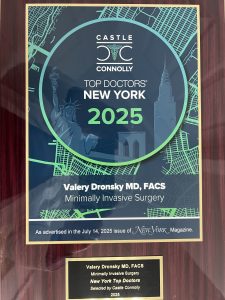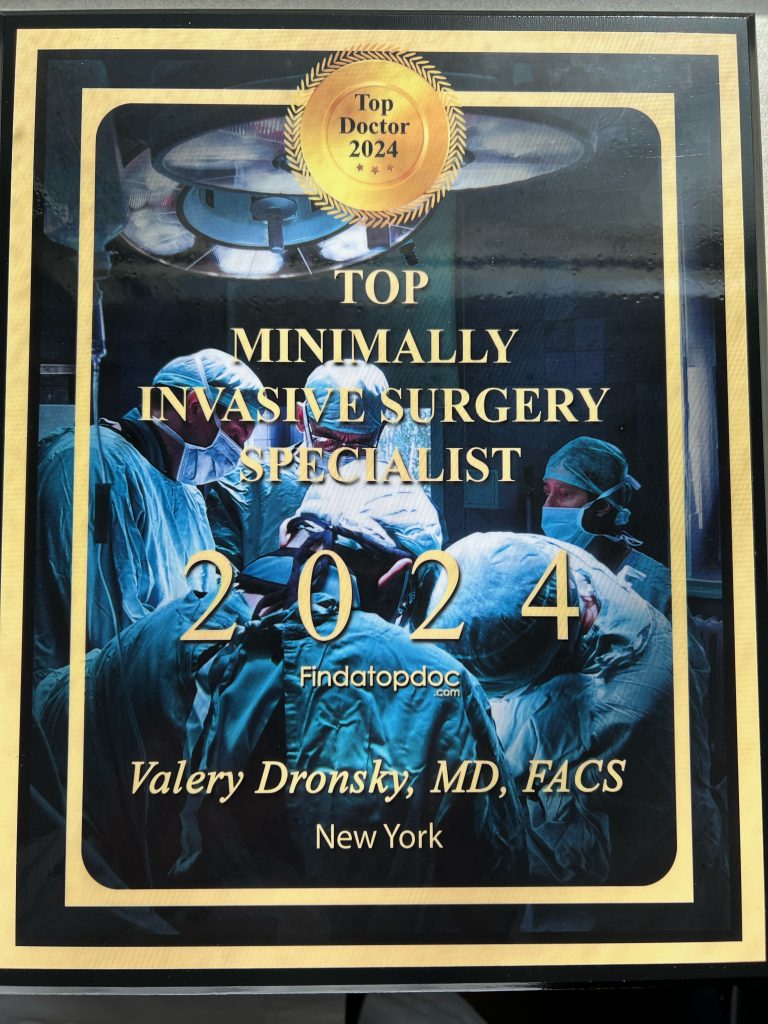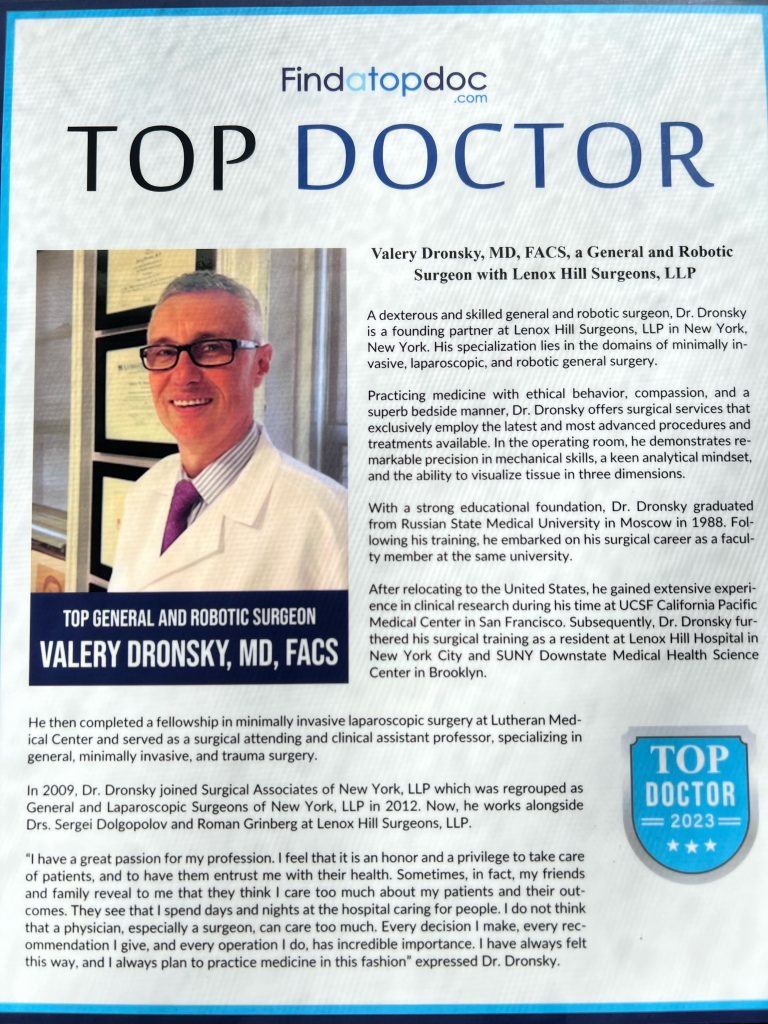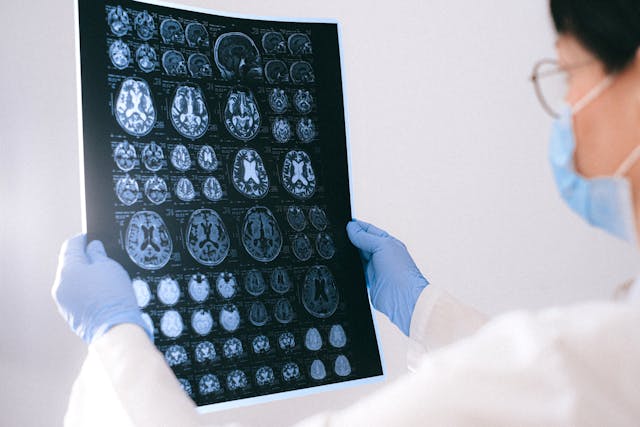CALL TODAY 646-846-1136 | EMAIL
Surgical Experts Dedicated to Improving Lives
At Lenox Hill Minimally Invasive Surgery PLLC, Dr. Valery Dronsky and his staff of medical professionals provide compassionate care with the highest ethical & professional standards. In our state of the art facility, we offer surgical services using only the most cutting edge and current procedures and treatments. We specialize in general surgery, including extensive experience in performing hernia repair surgery. Our expertise is in minimally invasive surgery and robotic surgery. Minimally invasive and robotic surgery often allow patients to experience easier recovery than traditional open surgery. They also allow for more precise and less traumatic surgery. When robotic and minimally invasive surgery is not an option, we are also skilled and experienced in traditional open surgical procedures.
Dr. Dronsky is an experienced and highly skilled surgeon having undergone extensive training in school, residency and fellowships. He practices medicine with ethical behavior, compassion and superb bedside manner. In the operating room he exhibits precision mechanical abilities, analytical thinking and the ability to visualize tissue in three dimensions. These innate and learned skills allow Dr. Dronsky to be one of the most dexterous and skilled professionals in New York City and the Country.
Call us: 646-846-1136
PATIENT TESTIMONIALS
Recent Awards
We are honored and deeply appreciative to have consistently received prestigious awards and recognition year after year, establishing us as one of New York’s foremost hospitals for a wide range of general surgeries, safety measures, specialized procedures, and overall excellence in healthcare. At Lenox Hill Minimally Invasive Surgery, our unwavering commitment lies in delivering exceptional care and unwavering support to our patients, guaranteeing their safety and successful recovery throughout their entire surgical experience.
Hospital Quality Awards
 America’s 50 Best Hospitals Award™ (2023, 2022)
America’s 50 Best Hospitals Award™ (2023, 2022)
Top 1% in the nation for providing the highest clinical quality year over year.

America’s 100 Best Hospitals Award™ (2021)
Top 2% in the nation for consistently delivering clinical quality year over year.

America’s 250 Best Hospitals Award™ (2023, 2022, 2021)
Top 5% in the nation for consistently delivering clinical quality.

Patient Safety Excellence Award™ (2023, 2022)
Top in the nation for providing excellence in patient safety by preventing infections, medical errors, and other preventable complications.
Specialty Clinical Quality Awards

America’s 100 Best Hospitals for Cardiac Care Award™ (2023, 2022, 2021, 2020, 2019)
Superior clinical outcomes in heart bypass surgery, coronary interventional procedures, heart attack treatment, heart failure treatment, and heart valve surgery.

America’s 100 Best Hospitals for Coronary Intervention Award™ (2023, 2022, 2021, 2020, 2019)
Superior clinical outcomes in coronary intervention procedures (angioplasty with stent).

America’s 100 Best Hospitals for Prostate Surgery Award™ (2023, 2022, 2021)
Superior clinical outcomes in prostate removal surgery and transurethral resection of the prostate.
Click to see all of our Healthgrades best doctors awards





Visit our main website at www.LenoxHillMinimallyInvasiveSurgery.com
Blog Posts are Below:
Tag Archives: Minimally Invasive Surgery
Minimally Invasive Surgery: Benefits and Procedures
Minimally invasive surgery (MIS) has revolutionized the field of surgery, offering numerous benefits over traditional open surgery. This guide explores the advantages and common procedures associated with minimally invasive techniques.

Benefits of Minimally Invasive Surgery
Minimally invasive surgery involves smaller incisions compared to traditional surgery, which leads to several key benefits:
- Reduced Pain: Smaller incisions result in less tissue damage, leading to decreased postoperative pain and discomfort.
- Shorter Recovery Time: Patients typically experience faster recovery times, allowing them to return to normal activities sooner.
- Lower Risk of Infection: The smaller incisions used in MIS reduce the risk of infection and other complications.
- Minimal Scarring: With less tissue disruption, patients benefit from minimal scarring and improved cosmetic outcomes.
- Reduced Blood Loss: MIS techniques often involve less blood loss during surgery, reducing the need for blood transfusions.
Common Minimally Invasive Procedures
Several surgical procedures can be performed using minimally invasive techniques. Here are some of the most common ones:
Laparoscopic Surgery
Laparoscopic surgery uses a thin, flexible tube with a camera and light at the end (a laparoscope) to view the inside of the abdomen. Surgeons make small incisions to insert surgical instruments and perform procedures such as gallbladder removal, hernia repair, and appendectomy.
Arthroscopic Surgery
Arthroscopic surgery is used to diagnose and treat joint problems. A small camera, called an arthroscope, is inserted into the joint through a tiny incision. This technique is commonly used for procedures on the knee, shoulder, elbow, and wrist.
Robotic-Assisted Surgery
Robotic-assisted surgery involves the use of robotic systems to enhance the precision and control of the surgeon. The surgeon operates the robot from a console, allowing for highly accurate movements. This technique is often used for complex procedures such as prostate surgery, hysterectomy, and cardiac surgery.
Endoscopic Surgery
Endoscopic surgery involves using an endoscope, a flexible tube with a camera, to access internal organs and tissues. This technique is commonly used for gastrointestinal procedures, such as removing polyps from the colon or treating conditions like gastroesophageal reflux disease (GERD).
Patient Eligibility for Minimally Invasive Surgery
Not all patients are candidates for minimally invasive surgery. Factors such as the type and severity of the condition, patient health, and previous surgical history play a role in determining eligibility. A thorough evaluation by a qualified surgeon is essential to decide the best surgical approach.
Preparing for Minimally Invasive Surgery
Preparation for MIS involves several steps, including preoperative evaluations, discussing medication adjustments, and understanding the procedure and recovery expectations. Patients should follow all preoperative instructions provided by their surgeon to ensure the best possible outcomes.
Postoperative Care and Recovery
Postoperative care following MIS is typically less intensive than traditional surgery. Patients can expect shorter hospital stays, quicker return to normal activities, and less postoperative pain. However, it is crucial to follow the surgeon’s postoperative instructions to promote optimal healing and prevent complications.
Minimally Invasive Surgery: Conclusion
Minimally invasive surgery offers numerous benefits, including reduced pain, shorter recovery times, lower risk of infection, minimal scarring, and reduced blood loss. Understanding the procedures and preparing adequately can help ensure a successful outcome.
For expert guidance on minimally invasive surgery and to determine if you are a candidate, contact Lenox Hill Minimally Invasive Surgery.
LENOX HILL MINIMALLY INVASIVE SURGERY
117 E 77th Street
Suite 1A
New York, NY 10075
Phone: 646-846-1136
Email: admin@lenoxmis.com
What Are The Benefits Of Minimally Invasive Surgery?
There was a time when the word “surgery” used to scare people, and they would try their best to evade a surgical procedure. The hesitance is understandable as the idea of a large cut on your body is discomforting in many ways. However, thanks to the evolution in medical science, surgical techniques have improved tremendously.
Now, surgical procedures, either big or small, are done within a few minutes to a few hours. The best part about the minimally invasive surgeries is the painless procedure with fast recovery. The advanced techniques are helping with quality treatments to patients who have to undergo surgical procedures.
What Is Minimally Invasive Surgery?
Unlike the traditional open surgeries that would require a large incision, a surgeon makes multiple tiny incisions of less than an inch. For the process, the surgeon uses
- Small surgical instruments, such as a clamp or knife, for incisions
- A laparoscope, i.e., a tiny tube with a miniature camera at one end.
Once the surgeon marks the incisions, he/she then passes the mini camera through one of the cuts. The doctor monitors the images captured by the camera on the screen and uses them as a reference. These images give the surgeon a clear picture of the area undergoing surgery.
The doctor may also insert specialized surgical instruments, such as a balloon or flexible stent, through the incisions if required. After the surgery, the surgeon stitches the incisions and sometimes places a mesh for additional support.
Common Minimally Invasive Procedures
Minimally invasive surgeries have become the first choice of patients for multiple medical conditions. In fact, it would not be wrong to say that these surgeries are now the standard surgical procedures for many routine operations.
Your doctor may recommend a minimally invasive surgery for:
- Appendectomy –the removal of the appendix
- Hernia repair
- Cholecystectomy –the removal of the gallbladder
- Abdominal examination
- Colon resection
- Gynecological surgeries
Depending upon the location of the surgery, you may call a minimally invasive technique an endoscopic surgery, a keyhole surgery, thoracoscopic surgery, or laparoscopy.
Benefits of the Minimally Invasive Surgery
Compared to the traditional open surgery, minimally invasive surgery has several benefits to offer. Not only is the procedure quick and less painful, but also ensures rapid recovery. Let’s have a look at some of the advantages.
Small Incisions/Cuts
One of the biggest advantages of the minimally invasive surgeries is the smaller incisions. The surgeon marks a few tiny incisions, big enough to insert a tube, laparoscope, or other small surgical instruments.
Accurate Procedures
The minimally invasive surgeries are more accurate than the open surgeries because of the laparoscope that gives a clear picture of the internal structures.
Less Painful Procedure
It is proven that minimally invasive surgeries are less painful in comparison to open surgeries. The advanced technique does not cause discomfort or any damage to the healthy tissues. Also, there is reduced blood loss in invasive surgeries.
Minimal Scars
Since the size of the incisions is smaller in the minimally invasive techniques, you may have very small or unnoticeable scar with a few stitches only.
Rapid Recovery
The minimal procedures allow the patient to heal sooner and resume the normal routine. Since the surgeries take a few hours to complete, the patient may leave for home the same day or the next day. A short hospital stay means reduced medical bill.
Final Thoughts
Minimally Invasive surgeries are the standard surgical techniques widely in practice today. Whether you have a minor issue or want a surgical intervention for a major health condition, it is the best option. At Lenox Hill Minimally Invasive Surgery, we have compassionate, dedicated, and highly professional surgeons who are expert in minimally invasive surgeries. Contact us today and book an appointment with the most skilled surgeons in NYC.
Appendicitis
Appendicitis is one of the most common factors responsible for abdominal pain, which can lead to surgery. More than 5 percent of people in the US experience appendicitis at some point. However, the pain most often occurs in people aged between 10 and 30.
Appendicitis is the inflammation of a 3.5-inch long appendix tube that protrudes from the large intestine. The condition calls for an immediate treatment, most probably surgery to remove the appendix.
Leaving an inflamed appendix untreated will cause the tube to burst. Thus, the inflamed appendix may start spilling infectious bacteria into the abdominal cavity. And, it may prove fatal sometimes.
Symptoms of Appendicitis
Usually, the first sign of appendicitis is a sudden pain that begins in the upper abdomen and radiates to the lower right portion of the abdomen. The pain may become excruciating when you cough or walk.
The inflamed appendix may cause you to lose appetite, or you may feel nausea or vomiting as soon as the pain begins. Abdominal bloating and low-grade fever, usually 99 – 102 Fahrenheit, may also serve as signs of the inflammation of appendix.
The other symptoms of appendicitis include severe cramps, dull or sharp pain in the back, rectum, or the lower or upper abdomen.
What Causes Appendicitis?
While the root cause of appendicitis remains unknown in most of the cases, doctors believe that inflammation occurs when the appendix is blocked. The obstruction in the lining may occur due to hardened stool, intestinal worms, enlarged lymphoid follicles or cancer.
The blockage in the appendix results in an infection, which may multiply the bacteria. Thus, it leads to the swelling and formation of pus in the appendix, thereby causing inflammation. You may also feel severe pain in the abdominal region, and if not treated timely, the appendix may rupture.
Appendicitis’ Diagnosis
The symptoms of appendicitis are often confused with that of the gallbladder diseases, bladder or urine infection, intestinal infection, gastritis, and ovary problems. This makes the diagnosis of appendicitis tricky. Your doctor may conduct these tests for diagnosing the inflammation in the appendix.
- Examination of the abdominal region: This helps identify the stiffening of the abdominal muscles when the doctor applies pressure on the appendix.
- Rectal Exam: The doctor examines the lower rectum with a lubricated gloved finger.
- Blood Test: The blood tests show a high white blood cell count in the body, thereby indicating an infection.
- Urinalysis: The urine test helps rule out a urinary tract infection or a kidney stone as a possible cause of the pain.
- Imaging Tests: The doctor may require an abdominal X-ray, ultrasound, a CT scan, or an MRI of the patient for the diagnosis of appendicitis.
Treatment: Appendectomy
The standard treatment for all appendicitis is appendectomy, i.e., the removal of appendicitis. The doctor may either perform open surgery or a laparoscopic surgery depending on the severity of the problem.
During the open surgery, the doctor makes an incision, which is usually 2 to 4 inches long. Doctors perform this type of surgery when the appendix has ruptured, and an excess abscess or puss has formed around it. Thus, the doctor drains the fluid and cleans the abdominal cavity.
Once the infection is under control, the doctor may perform minimally invasive or laparoscopic surgery. The surgeon will use some incisions to insert surgical instruments and a video camera into the abdominal region to remove the appendix.
Final Word
Do not neglect the pain that you experience in your abdomen. It may be a sign of an inflamed appendix. If you do not go for a treatment promptly, it may cause your appendix to rupture. Contact Lenox Hill Minimally Invasive Surgery in NYC today and book an appointment with the experts of minimally invasive surgery.
The Benefits of Minimally Invasive Surgery
Surgery has certainly come a long way since the advent of modern medicine. While we have been able to perform surgeries for much of history, it is only relatively recently that we have been able to do so in anything resembling a safe environment. Now that we have a much better understanding of germs and safety standards and the importance of sterilized equipment, we can perform surgeries with ease. And with a good degree of confidence, we can also predict the outcomes. Generally, the patient outlook is very good and every year we are globally improving our knowledge and techniques.
One of the major technological innovations that have allowed us to perform surgeries that were previously impossible are the robots we now possess. These robots are capable of not only performing surgeries but doing so with a level of precision that is entirely impossible for a human to replicate.
Smaller Incisions
Even without robots, we can still perform keyhole surgeries, which allow surgeons to use precise tools to perform some types of surgery with only a very small opening in the skin. When only a minimal incision needs to be made then we can make the smallest possible cuts in skin and muscle.
Less Pain
Smaller and more precise wounds mean much less pain and this has several knock-on benefits for the patient. Higher pain levels are often associated with lower moods during recovery. America is also currently in the grip of an opioid epidemic and as a nation, we need to do more to wean ourselves of these addictive drugs. Powerful opioids do have legitimate uses, but their routine prescription is becoming problematic. Increased pain levels also have an effect on our stress levels, with higher levels of pain sometimes making sleeping, and occasionally eating, much more difficult. A lack of sleep and a poor diet are both contributing factors for depression, with the individual generally more susceptible to infections and illness.
Shorter Hospital Stay
The net effect of all the benefits of minimally invasive surgery NYC is that patients can recuperate much faster and so require less time in the hospital, freeing up beds for more patients.
Less Scarring
Smaller wounds mean less scarring, and with surgical scars being a significant contributor to body image issues after major surgeries, this is far more important than many people realize.
To find out more about minimally invasive surgery NYC, drop into one of our clinics for a consultation.















